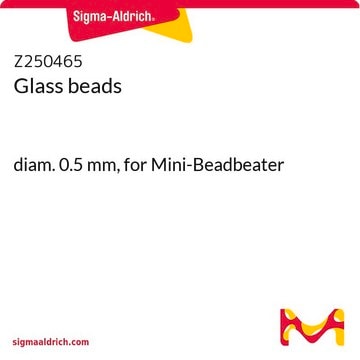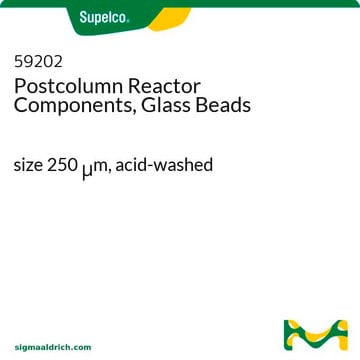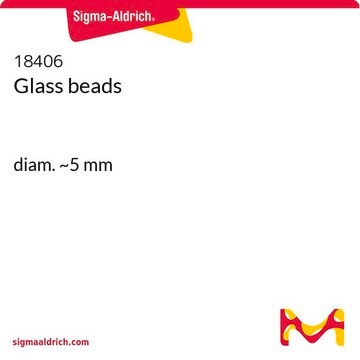G1277
Glass beads, acid-washed
212-300 μm (50-70 U.S. sieve)
Synonym(s):
Glass beads
Sign Into View Organizational & Contract Pricing
All Photos(4)
About This Item
UNSPSC Code:
41102422
NACRES:
NB.22
Recommended Products
particle size
212-300 μm (50-70 U.S. sieve)
Application
Acid-washed glass beads have been used:
- for the extraction of nucleic acids from pathogens
- for the preparation of Yarrowialipolytica cell extracts
- in chromatin immunoprecipitation assay of rat aorta tissues
Storage Class Code
11 - Combustible Solids
WGK
nwg
Flash Point(F)
Not applicable
Flash Point(C)
Not applicable
Personal Protective Equipment
dust mask type N95 (US), Eyeshields, Gloves
Certificates of Analysis (COA)
Search for Certificates of Analysis (COA) by entering the products Lot/Batch Number. Lot and Batch Numbers can be found on a product’s label following the words ‘Lot’ or ‘Batch’.
Already Own This Product?
Find documentation for the products that you have recently purchased in the Document Library.
Customers Also Viewed
Christopher N Acconcia et al.
Physics in medicine and biology, 62(18), L31-L40 (2017-08-09)
It is well established that high intensity focused ultrasound can be used to disintegrate clots. This approach has the potential to rapidly and noninvasively resolve clot causing occlusions in cardiovascular diseases such as deep vein thrombosis (DVT). However, lack of
Valeria Di Dato et al.
Scientific reports, 10(1), 5374-5374 (2020-03-28)
Prostaglandins (PGs) are hormone-like mediators in many physiological and pathological processes that are present in all vertebrates, in some terrestrial and aquatic invertebrates, and have also been identified in some macroalgae. They have recently been reported also in marine microalgae
Increased expression of CCAAT/enhancer binding protein-? and -? and monocyte chemoattractant protein-1 genes in aortas from hyperinsulinaemic rats
Sato Y, et al.
Diabetologia, 50, 481?489-481?489 (2007)
Thomas Dubois et al.
mBio, 11(4) (2020-08-21)
The crust is the outermost spore layer of most Bacillus strains devoid of an exosporium. This outermost layer, composed of both proteins and carbohydrates, plays a major role in the adhesion and spreading of spores into the environment. Recent studies
A method for correcting underestimation of enteric pathogen genome quantities in environmental samples
Pengbo L, et al.
Journal of Microbiology (2021)
Our team of scientists has experience in all areas of research including Life Science, Material Science, Chemical Synthesis, Chromatography, Analytical and many others.
Contact Technical Service














